When Jesus had finished teaching the parables about the kingdom, it was evening (Mark 4:35). The day had started positively when Jesus healed a demon possessed man (Matthew 12:22-23). But the day quickly turned negative when the people started responding to Jesus. The Jewish religious leaders did not welcome the response of the people and quickly claimed that Jesus had performed miracles with the power of Satan. They maligned His character because they were jealous (Matthew 12:24; Mark 15:10). Jesus responded by warning them not to credit His ministry to the work of Satan (Matthew 12:25-45). Then Jesus told the crowd that those who did the will of God the Father are those who are truly saved (Matthew 12:46-50). Later in the day, Jesus taught the crowd the parables of the kingdom. It must have been a very emotional, long day for Him. In order to escape the crowd, Jesus eventually gave orders to His disciples to get into a boat and go to the other side of the Sea of Galilee (Matthew 8:18). Jesus was tired and needed some rest. It had been a full day.
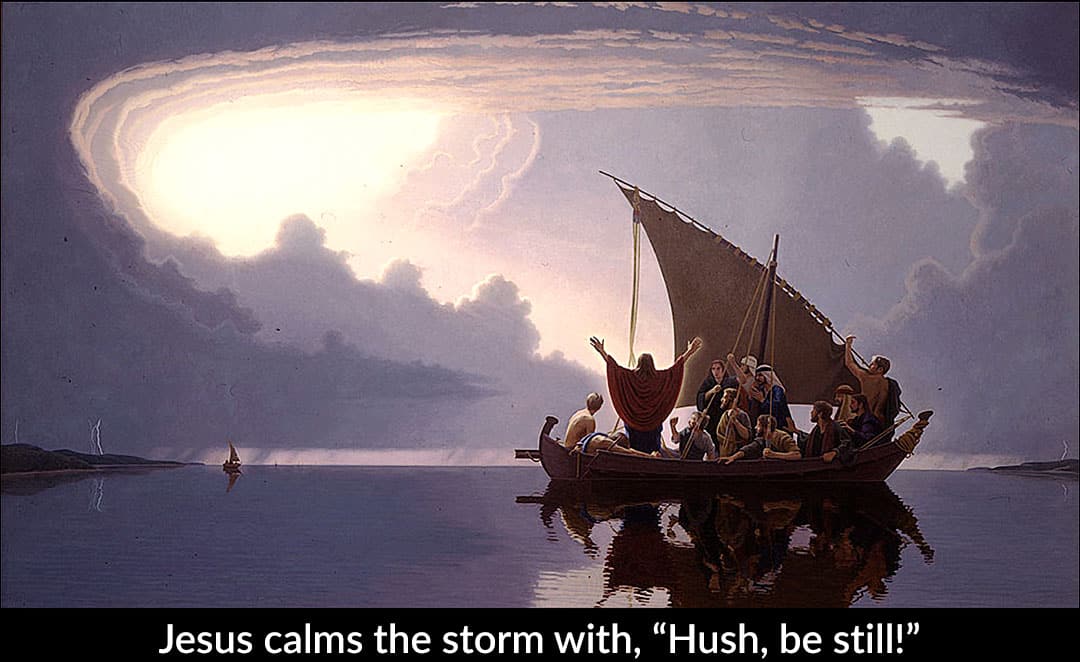
Leaving The Crowd
It appears that all the events of the day had occurred in the city of Capernaum on the west side of the Sea of Galilee. When Jesus directed His disciples to depart for the other side of Capernaum, He was referring to the east of the sea which today is called the Golan Heights. In Jesus’ day it was known as the country of the Gerasenes.
On that day, when evening came, He said to them, “Let us go over to the other side.” Mark 4:35 (NASB)
The sun was setting behind the men as they sailed across the lake. The sunset must have been beautiful as the sunlight mixed with the clouds in the sky. The trip would normally have taken less than two hours to cross the water, but trouble was about to occur on the water. The Sea of Galilee is about 13 miles (21 km) long and 8 miles (13 km) wide. The distance across the upper portion of the lake was even less.
The gospel of Mark tells us that the disciples led Jesus away from the crowd and helped Him get to the boat. The crowds must have been eager for Jesus to stay. Jesus needed help!
Leaving the crowd, they took Him along with them in the boat, just as He was; and other boats were with Him. Mark 4:36 (NASB)
Matthew 8:23 tells us that Jesus got into the boat first and then the disciples followed.
When He got into the boat, His disciples followed Him. Matthew 8:23 (NASB)
Mark 4:36 also alerts us to the fact that the crowd was very aggressive. They really did not want Jesus to escape. Some of them even got into other boats in order to follow Him. These people were persistent and unwilling to let Him have any rest. It reminds us of the popularity of Great Britain’s Princess Diana who was constantly surrounded by international photographers or paparazzi. Eventually, they contributed to a traffic accident and her death.
The crowd was thoughtless because they greatly desired Him. He was their healer and teacher and they wanted more of Him, just like a hungry lion eyeing a herd of antelope. Just imagine the disciples attempting to get away from the crowd and some of the crowd climbing into boats in order to go after Him. Wow, what a passion for Jesus. Today, we have His teachings written in a book called the Bible and yet, some do not care if they read what He said. In fact, some have never read the Bible. Some today might not have wanted to get into a boat and go after Jesus.
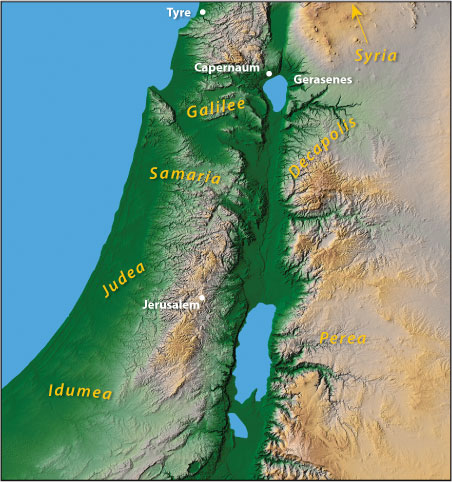
Asleep In The Boat
Somewhere along the journey, Jesus fell asleep because He was exhausted.
But as they were sailing along He fell asleep; and a fierce gale of wind descended on the lake, and they began to be swamped and to be in danger. Luke 8:23 (NASB)
We do not know how long they had been sailing before He fell asleep, we just know that He did. Mark 4:38 says that He was asleep in the back (stern) of the boat on a cushion.
Jesus Himself was in the stern, asleep on the cushion; and they woke Him . . . Mark 4:38 (NASB)
The boat was larger than a row boat. Otherwise, Jesus would have gotten wet, and the winds would have awakened Him. The stern of the boat must have had a protective cover or enclosure to protect Him from the elements of the storm.
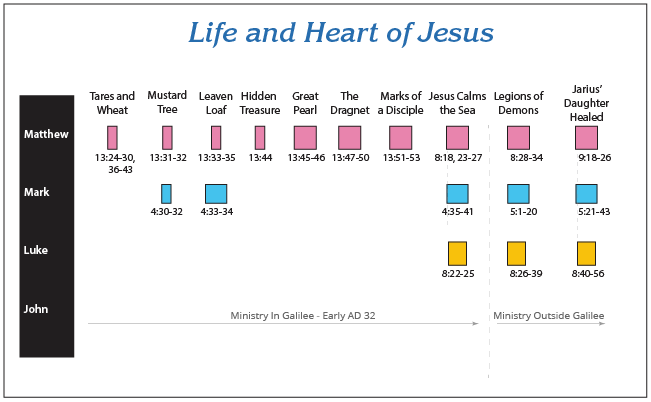
The Fierce Gale
After Jesus went to sleep, a “fierce gale” or great storm surprised them as they were crossing the sea. If they had expected this monstrous storm, they would not have attempted to cross the lake.
And there arose a fierce gale of wind, and the waves were breaking over the boat so much that the boat was already filling up. Mark 4:37 (NASB)
But as they were sailing along He fell asleep; and a fierce gale of wind descended on the lake, and they began to be swamped and to be in danger. Luke 8:23 (NASB)
The Greek word that is translated as “fierce gale” is LAILAPS. Matthew 8:24 calls it a “great storm.” It refers to a whirlwind or wind with cyclonic gusts. Kenneth Wuest, a Greek scholar, makes this comment,
The Greek word is used of a furious storm or hurricane. It never refers to a single gust, nor a steadily blowing wind, however, violent, but to a storm breaking forth from black thunder clouds in furious gusts, with floods of rain, and throwing everything topsy-turvy.[1]
Even in modern times storms drop from Mt. Hermon down into the Jordan Valley along the ravines. The drop of about 682 feet (208m) down to the Sea of Galilee results in a monstrous storm whipping across the water. We can imagine the winds shrieking through the rigging and the high waves slapping the sides of the boat and crashing over the boat as it bounced up and down over the huge swells. The Greek language reveals that the waves were repeatedly swamping or washing over the boat. This was a terrible storm.
At least four of the disciples in the boat (Peter, Andrew, James, and John) were experienced seamen and Matthew, who was there, records that this storm threatened the loss of the boat and most likely their lives. The boat was filling up with water as the waves continued breaking across the bow and washing along the boat. The boat was in danger of sinking and killing the men on board.
Were these men afraid? The answer is, “Yes!” They were all afraid, except for the One who was asleep. Just imagine Jesus asleep in the boat with everything that must have been occurring. The disciples were busy pulling in the sails, securing the boat, and hanging on to the boat while attempting to protect it from capsizing and sinking in the cloud covered darkness of the evening.
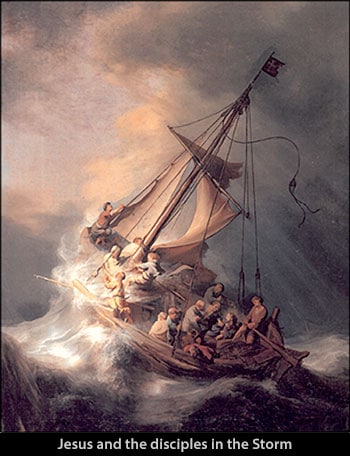
Jesus Awakened
Finally, the disciples awakened Jesus. They had delayed awakening Him until it was clear that they were in desperate trouble.
They came to Jesus and woke Him up, saying, “Master, Master, we are perishing!” Luke 8:24a (NASB)
Mark 4:38 is even more vivid and adds,
. . . and they woke Him and said to Him, “Teacher, do You not care that we are perishing?”
The Greek language reveals that the disciples were attempting to awaken Jesus. He did not awaken easily. He was too exhausted. Why did the disciples wait so long to awaken Jesus? The fact that they waited reveals their great respect for Him. But finally, their fears motivated them and they awakened Jesus. When He awoke, they probably very excitedly told Him about the winds and waves and that they were about to die because of the gale like storm.
Jesus responded to them with a rebuke before He got up and did anything. Wow, Jesus was perfectly calm inside. He was not worried or fearful. Jesus was not concerned about the waves or the wind.
He said to them, “Why are you afraid, you men of little faith?” Matthew 8:26a (NASB)
These men were fearful. Their problem was a lack of faith.
Then Jesus stood to His feet and calmed the storm with two Greek words that are translated as three, “Hush, be still!”
And He got up and rebuked the wind and said to the sea, “Hush, be still. And the wind died down and it became perfectly calm.” Mark 4:39 (NASB)
Jesus said, “be being silent” or “muzzle it” and, instantly, the winds stopped and the sea was perfectly calm. Some have claimed that the winds just coincidentally stopped and it appeared to the disciples that Jesus had performed a miracle. But that explanation does not account for the waters being perfectly calm as the surface of glass. Most people know that the waters would have continued to be turbulent for some time after the winds had stopped. The waves would not have been instantly, perfectly calm. No, this was a miracle and the men in that boat knew it, especially the seamen.
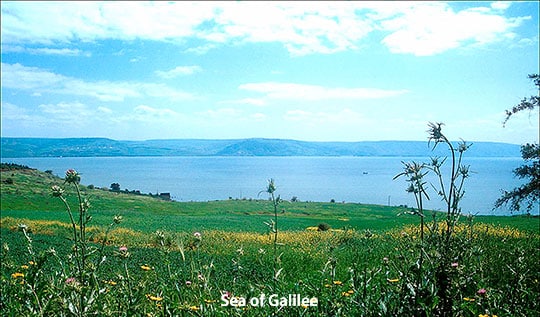
The Real Fear
If you had been in the storm with the winds howling in your ears, water crashing over you, and the boat filling up with water, how would you have felt? I know how I would have reacted. I would have been fighting for my life, the lives of my fellow disciples, and the life of Jesus. With my energy spent and our efforts being ineffective, I would have been fearful. How would you have felt after Jesus calmed the water and stopped the storm? Would you have been thankful and relieved? How did the disciples feel? The answer may surprise you.
They were fearful and amazed, saying to one another, “Who then is this, that He commands even the winds and the water, and they obey Him?” Luke 8:25b (NASB)
The disciples were more fearful than they were before Jesus had stopped the storm and its effects. They were greatly afraid of Jesus. The fear on their faces must have been obvious. They had been fearful of the storm and now they are exceedingly afraid of Jesus. Yet, Jesus ignores the obvious and asks them a question.
And He said to them, “Why are you afraid? Do you still have no faith?” Mark 4:40 (NASB)
Why are you afraid? Matthew 8:26 adds that Jesus also said they had “little faith.”
He said to them, “Why are you afraid, you men of little faith?” . . . Matthew 8:26 (NASB)
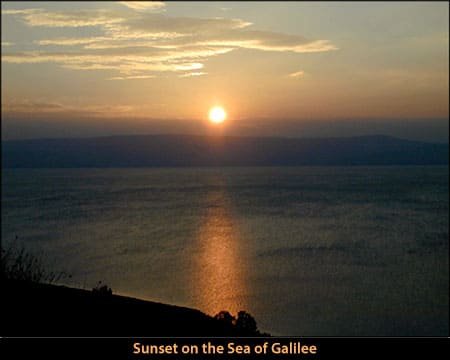
Seeking More Faith
Later in Matthew we will discover that Jesus will tell His disciples once again that they had little faith. In Matthew 14:31, He will tell Peter that the reason he started to sink into the sea as he was walking on the water was due to his little faith. In Matthew 16:8, Jesus will rebuke the disciples and tell them that they have little faith because they are worried about not having enough bread. And in Matthew 17:20, He will tell them that they cannot move a mountain because of their little faith. Their fear was due to their “little faith.” Are you fearful? If you are, it is because you have “little faith.”
If the disciples needed more faith, then we know that we need more faith! So how does a person obtain more faith? Initially, faith is given to us by the Holy Spirit as we listen and respond to the Word of God.
So faith comes from hearing, and hearing by the word of Christ. Romans 10:17 (NASB)
For by grace you have been saved through faith; and that not of yourselves, it is the gift of God . . . Ephesians 2:8 (NASB)
This is an important truth because it reveals that faith does not come as a result of a personal decision. Faith is the work of God in one’s life. 1 Corinthians 12:9 also reveals that the Holy Spirit can give us a spiritual gift of faith. This spiritual gift gives an individual believer an extraordinary amount of faith. This reveals that God not only gives us faith, He can also increase our faith. The apostles finally understood this truth and eventually they asked Jesus for more faith near the end of His ministry,
The apostles said to the Lord, “Increase our faith!” Luke 17:5 (NASB)
Our faith can also increase as we watch very spiritually, godly, mature men and women live their lives of faith. That is the message of Hebrews 13:7.
Remember those who led you, who spoke the word of God to you; and considering the result of their conduct, imitate their faith. Hebrews 13:7 (NASB)
These individuals are very mature, godly believers who know the Word of God and whose lives are great examples of Christ. Their lives are the result of the Holy Spirit’s work. Their lives are examples of the work of faith within them. These righteous individuals have lived by faith and it is obvious.
For in it the righteousness of God is revealed from faith to faith; as it is written, “But the righteous man shall live by faith. Romans 1:17 (NASB)
So our faith can increase as we listen to the Word of God, as the Holy Spirit works within us, and as we mimic the faith of godly “fathers of the faith.” Now I have a question for you. Are you seeking more faith? If so, then ask God for more faith just as the disciples did. Study the Word of God diligently, and ask God to give you someone whose life you can imitate.
Conclusion
After the disciples had heard Jesus say, “Hush, be still!” it is not a surprise that they asked, “Who then is this?” when the shrieking winds had stopped and the waves became as smooth as glass. “Who then is this?” He was and is the God of the universe, and the elements obeyed their Creator. For the disciples, Jesus was the perfect model of someone they could mimic, for no one is more perfect and holy than God Himself. The One who could silence the winds and calm the waters was the ultimate example of One whose faith they could imitate, for He was God Himself.
Today, our faith can grow as we study the Word of God and see Him in its pages. We can ask for more faith and seek to be more like Him by imitating someone who is closer to His likeness. Some day we will see Him face-to-face and faith will no longer be required because our little faith will be a thing of the past. Yes, the just shall live by faith and some day we will see the author and the finisher of our faith.
. . . fixing our eyes on Jesus, the author and perfecter of faith . . . Hebrews 12:2 (NASB)
Fix your eyes on Him and walk holy!
Reference:
1. Wuest, Kenneth. Mark, Wuest’s Word Studies From the Greek New Testament. Eerdmans Publishing Co. 1973. vol 1. p. 96.